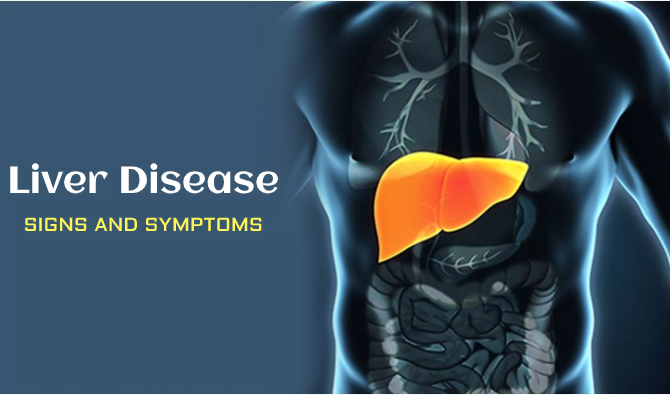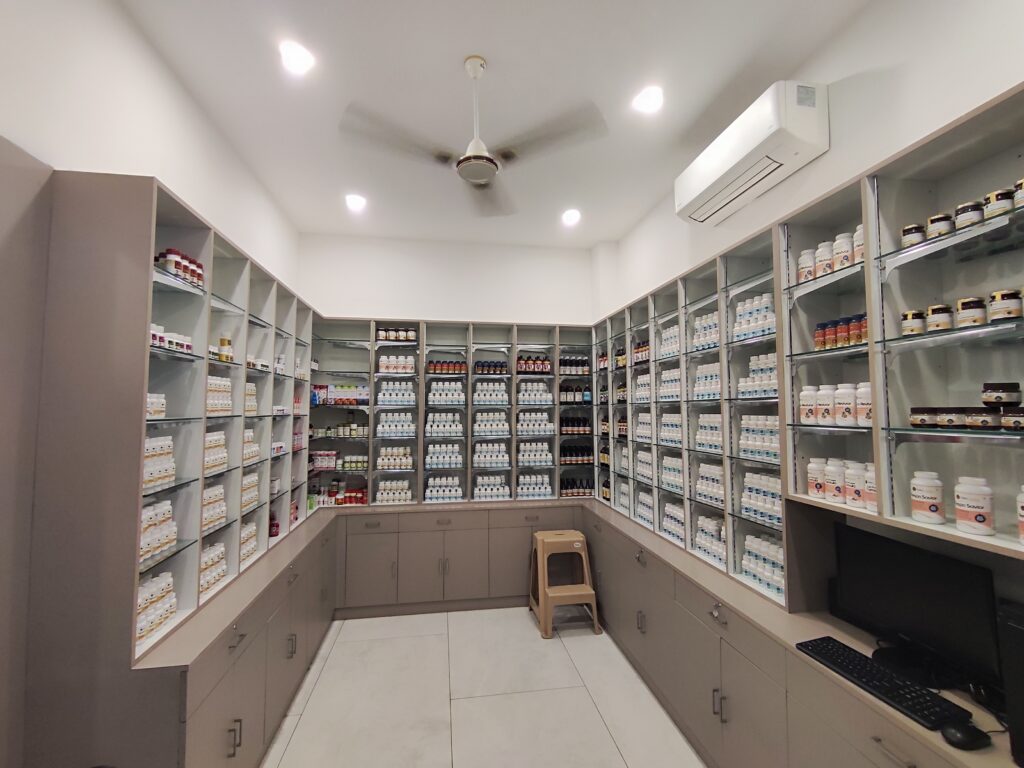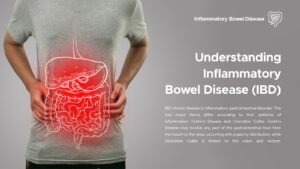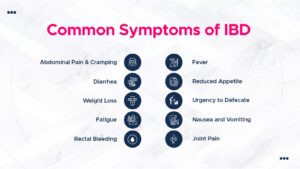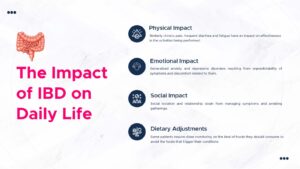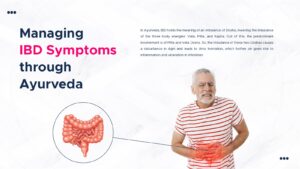Introduction:
Inflammatory bowel disease is a chronic inflammatory disorder of the gastrointestinal tract and includes two main presentations: Includes Crohn’s Disease as well as ulcerative colitis. The main advantage of this approach is its applicability to all chronic character diseases with constantly occurring symptoms, though it cannot be considered one of the less significant diseases affecting the general quality of a patient’s life due to possible complications
Understanding IBD by the modern and Ayurvedic approaches to health and disease together could give quite a holistic approach toward managing this chronic, difficult disease. This article elaborately explains the common symptoms, diagnosis, and treatment of IBD, having an impact on daily life and management according to the approach of both modern medicine and Ayurveda.
Understanding Inflammatory Bowel Disease (IBD):
IBD chronic disease is inflammatory gastrointestinal disorder. The two major forms differ according to their patterns of inflammation: Crohn’s Disease and Ulcerative Colitis. Crohn’s Disease may involve any part of the gastrointestinal tract from the mouth to the anus, occurring with a patchy distribution, while Ulcerative Colitis is limited to the colon and rectum; its inflammation involves continuous tissue. The prevalence of IBD has been increasing in almost all areas and regions of the world, but with extreme variations across different regions and demographics.
The most common symptoms of IBD encompass abdominal pain, diarrhea, rectal bleeding, weight loss, and fatigue. In Crohn’s disease, it may further manifest with strictures and fistulas, while in ulcerative colitis an increased risk of colon cancer. Long-term management is therefore required to maintain remission and prevent complications because of its chronic and recurrent nature.
Common Symptoms of IBD
Abdominal Pain and Cramping: They can be felt in the lower abdomen and over the course of a day or a week, sometimes altering in severity.
Diarrhea: Small amounts; bloody or mucousy.
Weight Loss: Due to malabsorption of nutrients or reduced appetite.
Fatigue: Often a result of chronic inflammation or anemia.
Rectal Bleeding: Far more representative in patients with ulcerative colitis.
Fever: This is usually caused by inflammation or infection of the area.
Reduced Appetite: Cause weight loss and malnutrition.
Urgency to Defecate: A condition that makes a person run to the washroom frequently most of the times.
Nausea and Vomiting: Especially if there is a blockage or severe inflammation, and if a patient has been diagnosed with a disease.
Joint Pain: Arthritis or joint pain could be a related condition that patients with IBD develop.
Diagnosing IBD
Diagnosis of IBD is purely clinical and should be supported by clinical symptoms along with laboratory investigations, radiology, and endoscopy. Colonoscopy with biopsy remains the gold standard of diagnosis since it visualizes the mucosal surface of the intestine and allows for histopathologic evaluation of the biopsy. Surgical intervention may be required in case of complications in the form of strictures, fistulas, or refractory disease. The holistic approach to the management of IBD raises significant questions of lifestyle modification, diet, and neuropsychiatric support.
The Impact of IBD on Daily Life
– Physical Impact: Similarly chronic pain, frequent diarrhea and fatigue have an impact on effectiveness in the activities being performed.
– Emotional Impact: Generalized anxiety and depressive disorders resulting from unpredictability of symptoms and discomfort related to them.
– Social Impact: Social isolation and relationship strain from managing symptoms and avoiding gatherings.
– Dietary Adjustments: Some patients require close monitoring on the kind of foods they should consume to avoid the foods that trigger their conditions.
Managing IBD Symptoms through Ayurveda
In Ayurveda, IBD holds the meaning of an imbalance of Dosha, meaning the imbalance of the three body energies: Vata, Pitta, and Kapha. Out of this, the predominant involvement is of Pitta and Vata Dosha. So, the imbalance of these two Doshas causes a disturbance in Agni and leads to Ama formation, which further on gives rise to inflammation and ulceration in intestines. Correlation can thus be made between Crohn’s Disease and Ulcerative Colitis with conditions described in Ayurvedic texts under Grahani—a concept belonging to malabsorption syndrome—and Raktatisara, or bloody diarrhea.
Diagnosis in Ayurveda
An Ayurvedic diagnosis consists of a proper examination of the patient’s Prakriti and Vikriti. Some of the diagnostic methods that are employed to understand the precise cause of Dosha imbalance are pulse diagnosis or Nadi Pariksha, examination of the tongue, ophthalmic examination, examination of the stool, and detailed patient history.
Ayurvedic Treatment Options for IBD
Ayurvedic treatment is therefore targeted to restore the balance of the Doshas and to enhance Agni. Herbal medicines include Kutaja, Bilva, and Yashtimadhu.
If you are struggling against Ulcerative Colitis (UC), or Irritable Bowel Syndrome (IBS), then Gut Heal , Cap. KUTAJBILWA, Cap. Pitta Balance and Yukti Herbs GILOY CAPSULES are known for their rejuvenating properties and can help support overall health and balance Pitta dosha. Can prove to be a savior of your Gut Health.
The detoxification and rejuvenation would be done using such Panchakarma therapies as Virechana, or purgation, and Basti, or medicated enemas. Dietary advice is usually easy-to-digest food and abstinence from spicy and acidic foods that may further irritate the gut. One should add to their diet gut-healing spices like turmeric and ginger. And to the list of lifestyle changes: some ways to help manage stress are yoga and meditation.
Comparative Analysis: Ayurveda along with Modern Allopathy
Inflammatory bowel diseases, like Crohn’s disease and ulcerative colitis, are well managed without tactic approaches comparing the strength and weakness of Ayurveda and modern medicine. On the one side, there is a hi-technology of modern medicine, which offers the precise diagnosis and stronger medicine production. While on the other hand we have Ayurveda, more focused on the outlook of treatment and has stronger interest in the cause of the diseases as well as the total health of a patient. A treatment strategy likely to derive more benefits out of these approaches is the one that combines the two. For example, although the contemporary drugs are useful in managing the acute inflammation, Ayurvedic modalities may have a place in the management of the status of remission and in enhancing the patient’s quality of life. As proposed by case series and anecdotal reports, the use of an integrative approach is effective; however, there is a need for randomized controlled trials.
Advances in IBD Research and Treatment
New IBD management prospects are offered through the advancement in genetic analyses and novel biologic treatment strategies in today’s medicine. One would even get an impression that the future could very well lie with a more targeted approach which is further being researched with the help of the concept of microbiome and the subsequent advancement in the field of precise medication. More focus in Ayurveda is today for looking for modern substantiation with the help of clinical researches for the traditional remedies. This would create new opportunities to combine the treatment plan, which reflects the strengths of both the schools to be more effective in treatment and response to the patients’ needs in confined with Ayurveda and modern medicine practitioners.
Conclusion
The understanding of IBD chronic disease from the perspective of both Ayurveda and modern medicine, then, would truly highlight what a holistic and patient-centered approach would be for the management of this chronic disease. Whilst tools exist for the effective diagnosis and acute management in modern medicine, Ayurveda has much to offer for long-term health and well-being. Integrative treatment strategies as a collaborative treatment give meaning to quality of life in patients affected by IBD, therefore more research and validation of these two medical traditions should be conducted.



